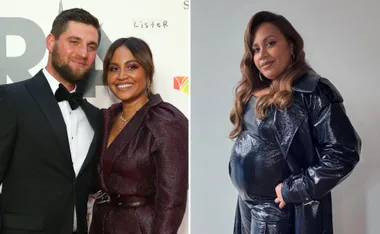Exclusive extract from Blind Submission (Allen and Unwin) by Debra Ginsberg.
“Well, why don’t we sit down and get started?” Lucy said, gesturing for me to sit on the couch. Craig positioned himself on a chair next to me, holding a legal pad on his lap. Lucy sat down next to me, so close our knees were almost touching, holding a small pad of her own.
“Now, where’s your résumé?” she said to nobody in particular. “Nora!” she yelled toward the door. “Can I have this woman’s résumé please?”
Nora appeared at the door and said, “It’s on your desk, Lucy.”
“It most certainly is not.”
Nora shuffled over to Lucy’s oversize glass desk, removed a sheet of paper, which I immediately recognised as my résumé, and handed it to Lucy.
“Nora, it would help me a great deal if you didn’t hide these things, don’t you think?” Lucy said. Nora simply sighed and left the room.
“Okay,” Lucy began, “Angel Robinson. What a name! Surely that’s not your real name. You must have changed it, yes?”
“No, no, that’s my real name. From birth.”
“Then maybe you ought to change it. I mean, Angel of all things. Quite a title to live up to, I’d think.”
“Well, my mother … she saw me as her little angel, she said, when I was born, and so she thought, I mean …”
I trailed off into an awkward silence. The truth was, I’d always been embarrassed by my name. It didn’t help that the mega-bestselling book Freakonomics listed Angel as the number one “white girl” name that best indicated parents who were uneducated. I hoped Lucy hadn’t read Freakonomics and resisted the urge to wipe my hands on my dress. My palms were slick with sweat and I could feel the prickle of perspiration on my lower back.
“Names are very important,” Craig said suddenly. Again, I was startled to hear such a deep, sensual voice coming out of such of a mouse of a man. I didn’t know if I’d be able to get used to it. “My wife decided to hyphenate our names so that we could keep our own identity,” he added.
“Hyphens are even worse,” Lucy said dismissively, and then stopped short as if something important had just occurred to her. “Do you have a husband?” she asked me, her tone making husband sound a lot like herpes.
“No, no. I mean, I have a boyfriend — fiancé, actually — and he …” He what? I cursed myself. Is writing a book? Would love to be represented by you? How was it possible that I had spoken no more than a handful of words and was already in such a deep hole? And why had I referred to Malcolm as my fiancé? The two of us hadn’t even come close to making any official plans to wed.
“Are you planning to get married sometime soon, then?” Lucy asked. “I mean, I’d hate to offer you a position and then have you disappear on honeymoon or something. Or get pregnant. You’re not planning babies, are you? Little Angels, as it were? Because we can stop right here if you are and not waste any more time. Time is money here and I don’t have nearly enough of it to squander.”
“Actually, we haven’t really set a date.” I could hear my own voice getting smaller in my throat. “And I haven’t even begun to think about children.”
“Good,” Lucy said, “because this is an extremely busy office, and while I don’t expect my employees to work 24 hours a day, there will be plenty of reading to do outside of the office and occasions when you may have to come in early or stay late. And as my assistant — ” Lucy stopped herself short, her eyes narrowing, a new question working its way to her lips. “You understand that this position is that of my assistant?”
“Yes, of course,” I said, but I was confused by her emphasis.
“Because if you were thinking of being hired as an agent, we should probably terminate this interview immediately.”
“Oh no,” I rushed to assure her, “I understand the position. And I’m not interested in agenting.” I gave Lucy a broad smile to underscore my words, but I questioned, if only for a fraction of a second, just how truthful they were. Would I be interested in being an agent myself? Who knew? I hadn’t even seen it as a possibility until that moment. I was surprised, and maybe even a little intrigued, that Lucy had. But no, I thought again, I could never —
“Good,” Lucy said, drilling me with her laser eyes.
Nora entered the room once more. “Lucy,” she said, “Natalie Weinstein’s on line two for you.”
“I have to take this,” Lucy said, leaping from the couch. “This is a very important editor. I’ve been waiting for this offer.”
Craig rose from his seat in tandem. “I’m going to make a couple of calls while you get this, he said. “I’ll be back in a few.”
“Fine, go, go,” Lucy said. “You can make yourself comfortable, Angel. Have a look at all of our books.” She made a sweeping gesture at the room around us and then sat down at her desk to take the call.
“Natalie, my dear,” she began, “we are in business on this delicious book? I’d love to tell the author that you have won the prize …”
My head had started to buzz and I found myself unable to focus on Lucy’s conversation. I felt my interview had started badly, but I couldn’t explain why. I distracted myself by looking around the room. There was a display on my left, a virtual shrine to Karanuk that I hadn’t noticed earlier. Nestled between various animal pelts and a costume I assumed was native Alaskan garb was every edition of Cold! in print. Beside all the English editions in hardcover and paperback there were two shelves of foreign editions. I studied the spines for title changes. Fa Freddo! screamed the Italian title in red. The French copy was much quieter. Le Froid, it said in beige lettering. There was no exclamation point.
“No, it’s certainly not a bad offer,” Lucy was saying, “but this pay-out schedule is simply not going to work. Frankly, the author’s no spring chicken, if you know what I mean. Is she going to live long enough to get this money? I can’t say.” Lucy flashed me a toothy grin. I smiled back and turned my head, afraid to be caught eavesdropping, even though she was clearly speaking loud enough for me to hear every word. But some poor writer’s fate was hanging on the outcome of this conversation and it just seemed wrong for me to know how it all turned out before the writer did.
“No, I’m not implying that she’s ill,” Lucy went on. “What I’m saying is that we might all be dead by the time this advance is paid out.”
I turned my attention to another shelf of books. A slim volume caught my eye. I recognised it immediately as Long Shadows, the one book that I’d always said I’d want with me on a deserted island. It was a short but densely written novel about three generations of women who were all writers. Through the different voices of her characters, the author gave a layered, intricate account of women, history and the writing process. I’d first read it in college and still kept my copy where I could reach it easily, just to thumb through it. It was the author’s first and only book. I reached over, almost involuntarily, pulled the book from the shelf, and felt its compact weight in my hand. I let out a breath I didn’t realise I had been holding and got a little light-headed.
I knew then that Malcolm was absolutely right about this being the perfect job for me.
Book Club questions
Lucy Fiamma is the boss from hell — other than leaving, could Angel have done anything to improve the situation?
Does Angel compromise herself by staying on?
Were Malcolm’s demands on Angel to push his manuscript outrageous or did he have a right to ask Angel to help him?
Does the story destroy any illusions you might have had about the world of publishing?
If you wrote a book would you want the amoral Lucy as your agent?











